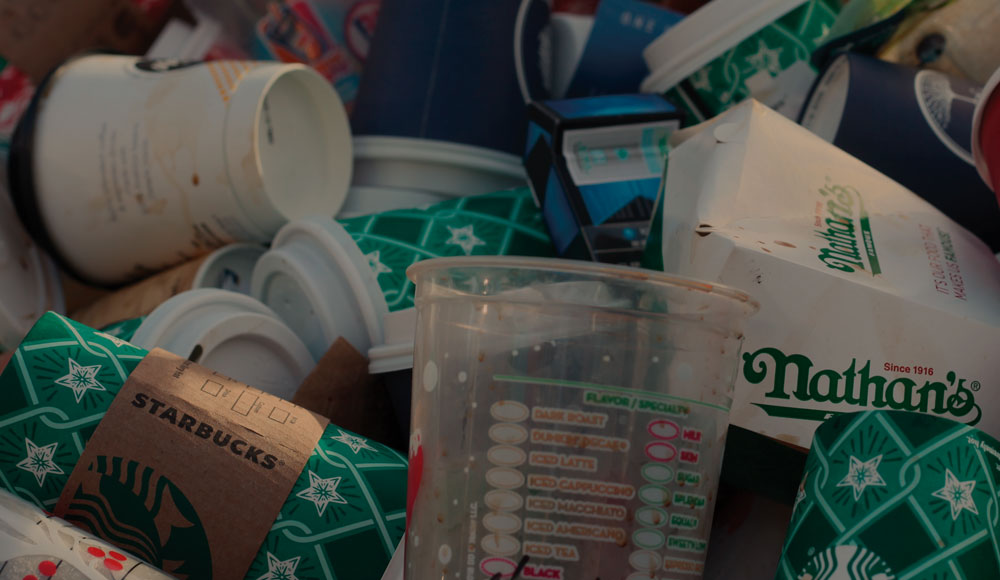
Consumption of our beloved beverage is hurting the planet. We look at how resourceful Australian coffee businesses, large and small, are doing a great job of turning things around
With over a billion disposable cups thrown away in Australia every year, it’s good to know that there is a growing force of globally conscious coffee businesses taking big steps to reverse that trend – and it’s not just about the cups.
“We were a bunch of do-gooders picking up rubbish from beaches and we began to notice more and more hospitality waste showing up,” explains Jo Horsley – General Manager of ResponsibleCafes.org. The result of this discovery was the creation of a digital concept that engages directly with cafes and rewards them for being green. Participating businesses can log their environmental impact and earn ‘bean’ ratings, with gold bean status being the Holy Grail.
Preventing coffee cup waste is just the entry point into the scheme. Avoidance of plastics – in bags, straws, containers and condiments – as well as offering free water refills are all winners. Further points are earned for composting everything from coffee to cups and containers; supporting Fair Trade products; using non-toxic cleaning products; tapping into renewable energy; as well as supporting community events, resources and even providing coffee grounds to local gardeners or community garden projects.
“The only way we’re going to resolve the situation is by collaborating. We aim to re-educate people about waste and incentivise behaviour change,” says Horsley. The organisation is planning a five event summit that will help participating cafés to build a plan to reduce waste and reduce operating costs at the same time.
One cafe that proudly wears its Gold Bean status is the zero-waste Cat & Cow cafe in Sydney’s Eastern Suburbs. “We wanted to show other cafés that this is the way forward and it’s easy to do in the hospitality space,” says Lenka Kriz, Director at Cat and Cow Coffee. “We designed our cafe to be fully waste free in the front of the house operations.”
“We actually save a lot of money on packaging. Our compost bin is always full but we only use about 10 percent of our general waste bin.”
Educating customers to bring their own cups was initially a challenge when they opened in August 2019 but the plan is definitely working for them. “We actually save a lot of money on packaging. Our compost bin is always full but we only use about 10 percent of our general waste bin.”
Lenka explains that even during lockdown they found a way to stay true to their mission. “We had to make the hard decision to introduce single use coffee cups into our operations. These cups were commercially compostable and recyclable.” The extra 50 cents charged for this service was donated to an ocean clean-up initiative called Take 3 for the Sea (www.take3.org).
Sydney-based coffee roaster, Pablo & Rusty’s (P&R), has just become the first coffee company in Australia to be regarded as a carbon neutral organisation. Founded by Saxon Wright in 2003 the objective soon became to create zero waste throughout the whole supply chain – from farm to cup.
One of Wright’s early creations was the award-winning HuskeeCup (see separate story ‘Swap ‘n’ Go your coffee cup) but becoming certified means a lot to the company. “Carbon Neutral is the next step on our ongoing journey to become more sustainable. We have changed or upgraded many aspects of our business to reduce our carbon footprint already so getting certified is a way to wrap it all up,” he explains.
P&R recognise that all business leaves a dirty footprint, and coffee roasting is no different. However, by offsetting the elements that they can’t reduce, it assures customers that their purchase is covering a completely sustainable process.
“We still have so many things we want to do and can improve on. We are going through an overhaul of our packaging to ensure its either compostable or recyclable, plus looking at other ways to get our organic waste back to the land to improve our soils.”
There are a host of companies doing the right thing and it’s good to know that by making informed choices and supporting the businesses making the effort, we can reduce our environmental impact while still enthusing about speciality coffee.
SOCIAL MEDIA
Keep up to date with Caffeine magazine Australia.
Follow us on Facebook and Instagram.
@caffeinemagaus
